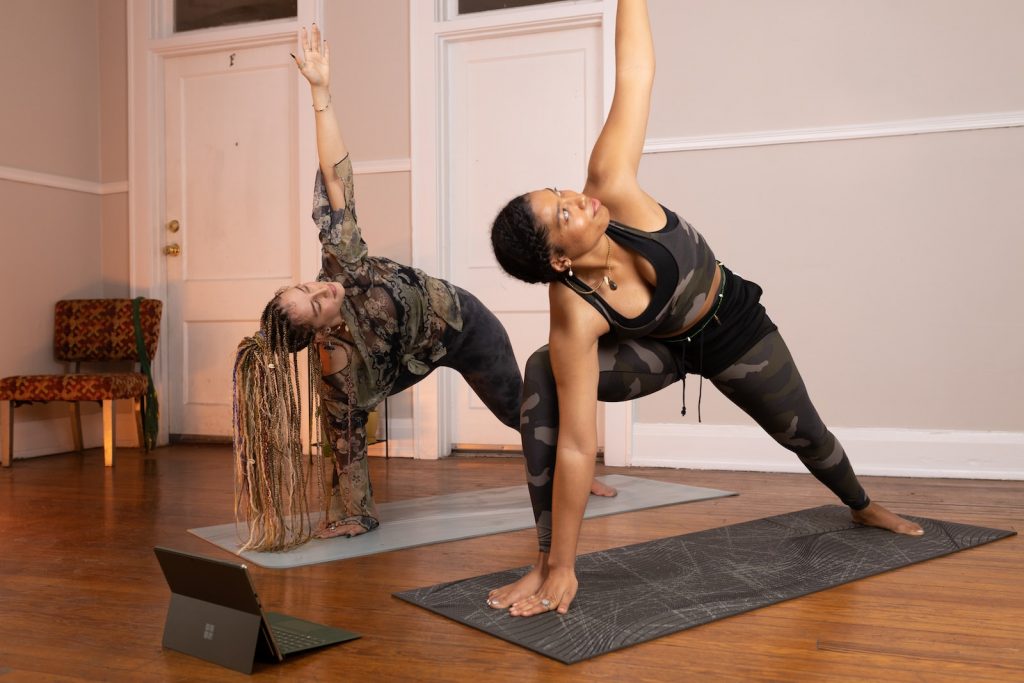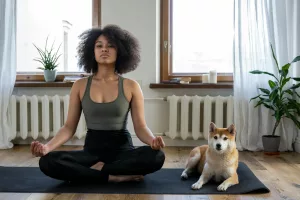The Benefits of Incorporating Yoga into Your Daily Routine: From Stress Relief to Improved Mental Health

Yoga has been around for thousands of years and has been practiced by people all over the world for its many physical and mental benefits. In today’s fast-paced world, it’s easy to get caught up in the hustle and bustle of daily life. We’re constantly on the go, running from one task to the next, trying to keep up with work, family, and social obligations. But amidst all the chaos, it’s crucial to take a step back and focus on our own well-being. One of the best ways to do that is through the practice of yoga. Yoga has been shown to not only reduce stress but also improve overall mental health. In this post, we will explore how incorporating a daily yoga practice can help alleviate stress and improve your overall well-being, as well as different types of yoga for stress relief.
The Science Behind Yoga and Stress Relief
Yoga is a holistic practice that combines physical postures, breathing exercises, and meditation. This combination of mind-body practices has been shown to have a positive effect on the body’s stress response. When we’re stressed, our bodies release cortisol, a hormone that triggers the “fight or flight” response. Yoga helps to lower cortisol levels, bringing the body back into a state of balance. Research has also shown that regular yoga practice can improve mood, reduce anxiety and depression, and increase feelings of well-being. Yoga has also been found to be beneficial for people with conditions such as post-traumatic stress disorder (PTSD) and obsessive-compulsive disorder (OCD).
Physiological Benefits of Yoga
The physiological benefits of yoga extend beyond just lowering cortisol levels. Yoga enhances the production of endorphins, the body’s natural mood lifters, which contribute to a sense of happiness and relaxation. Moreover, yoga practices that incorporate controlled breathing or pranayama can improve lung function and elevate oxygen levels in the blood, both of which are crucial for optimal brain function and stress reduction.
Psychological Benefits of Yoga
On a psychological level, yoga promotes mindfulness, enhancing your awareness of the present moment. This awareness can help break the cycle of stress-inducing thought patterns. Studies have shown that yoga can increase levels of gamma-aminobutyric acid (GABA), a neurotransmitter that helps in reducing anxiety and promoting an overall sense of calm.
How to Incorporate Yoga into Your Daily Routine
The great thing about yoga is that it can be practiced by people of all ages and fitness levels. Here are a few tips for incorporating yoga into your daily routine:
- Start Small: If you’re new to yoga, start with just a few minutes a day and gradually increase the time as you become more comfortable with the practice. Even a 5-10 minute morning routine can set a positive tone for the day.
- Find a Class That’s Right for You: Yoga classes come in all shapes and sizes, so find one that fits your needs and comfort level. Whether you prefer an in-person class at a local studio or a virtual class from the comfort of your home, there are many options available.
- Practice at Home: You don’t need to go to a studio to practice yoga. There are many online resources and videos available that can guide you through a yoga practice at home. Apps like Yoga with Adriene or Down Dog offer personalized classes that fit your schedule.
- Make It a Habit: Like any other habit, it takes time to form a daily yoga practice. Be consistent and make it a part of your daily routine. Set a specific time each day for yoga, whether it’s in the morning to energize your day or in the evening to wind down.
- Experiment with Different Styles: There are many different styles of yoga, such as Hatha, Vinyasa, and Yin. Try different styles to find one that resonates with you. Each style offers unique benefits, so a bit of experimentation can help you find what suits your needs best.
Creating a Yoga Space at Home
Creating a dedicated yoga space at home can enhance your practice. Choose a quiet, clutter-free area where you won’t be disturbed. Use a yoga mat, and consider adding props like blocks and straps to assist with poses. Having a serene, inviting space can make it easier to commit to a regular practice.
The Different Types of Yoga for Stress Relief
Hatha Yoga
Hatha yoga is the most traditional and widely practiced style of yoga. It is characterized by the use of physical postures, called asanas, and the focus on proper alignment and breathing. Hatha yoga is a great choice for beginners as it is a relatively slow-paced and gentle practice. It is also a great option for people looking to improve their flexibility and strength. Classes often include a combination of standing and seated poses, making it accessible to various fitness levels.
Vinyasa Yoga
Vinyasa yoga is a more dynamic and physically demanding style of yoga. It is characterized by flowing sequences of postures that are linked together with the breath. Vinyasa yoga can be a great option for people looking to improve cardiovascular fitness and build muscle strength. However, it is not recommended for people who are new to yoga or have physical limitations. The continuous movement can help increase endurance and promote a sense of vitality.
Yin Yoga
Yin yoga is a slow-paced and meditative style of yoga that focuses on the deeper connective tissues of the body. It is characterized by long-held, passive poses that are held for several minutes at a time. Yin yoga can be a great option for people looking to improve flexibility and reduce stress. The stillness and depth of the poses encourage introspection and a deep sense of relaxation.
Restorative Yoga
Restorative yoga is a gentle and soothing style of yoga that is characterized by the use of props, such as blankets and bolsters, to support the body in a comfortable and relaxed position. Restorative yoga can be a great option for people looking to reduce stress and improve overall well-being. This practice promotes deep relaxation and can be particularly beneficial for those recovering from illness or injury.
Additional Benefits of Yoga
Beyond stress relief and mental health improvements, yoga offers a plethora of benefits that can enhance overall quality of life.
Improved Flexibility and Strength
Regular yoga practice enhances flexibility by gently stretching muscles and soft tissues. This can lead to improved posture, reduced risk of injury, and relief from chronic pain. Additionally, many yoga poses build strength in various muscle groups, contributing to overall physical fitness.
Better Sleep
Yoga has been linked to improved sleep quality. Practices that include relaxation techniques and breathing exercises can help calm the nervous system, making it easier to fall asleep and stay asleep. Poses like Legs-Up-The-Wall are particularly effective for promoting restful sleep.
Enhanced Focus and Clarity
The meditative aspects of yoga can help improve concentration and mental clarity. By focusing on the breath and body, yoga encourages mindfulness, which can lead to improved cognitive function and decision-making skills.
Boosted Immune System
Yoga’s stress-reducing qualities can have a positive impact on the immune system. Lower stress levels equate to a better functioning immune system, which can help ward off illnesses.
Common Mistakes and How to Avoid Them
It’s easy to make a few missteps when starting a yoga practice. Here are some common mistakes and how to avoid them:
- Pushing Too Hard: Yoga is not about pushing your body to its limits. Listen to your body and respect its boundaries. Overstretching can lead to injuries.
- Skipping the Warm-Up: Always start with a warm-up to prepare your body for more intense poses. This can prevent muscle strain and enhance your practice.
- Holding Your Breath: Breathing is a fundamental part of yoga. Ensure you maintain smooth, steady breathing throughout your practice to enhance relaxation and focus.
- Comparing Yourself to Others: Yoga is a personal journey. Focus on your own practice and progress, rather than comparing yourself to others in a class.
Tips for Staying Motivated
- Set Clear Goals: Define what you want to achieve with your yoga practice, whether it’s stress reduction, increased flexibility, or improved strength.
- Track Your Progress: Keep a yoga journal to note improvements, breakthroughs, and challenges. This can help you stay motivated and recognize your growth.
- Join a Community: Engage with a yoga community, whether online or in-person. Sharing experiences and connecting with others can provide encouragement and support.
- Celebrate Small Wins: Acknowledge and celebrate your progress, no matter how small. This can boost your motivation and reinforce your commitment to your practice.
Yoga is a powerful tool for stress relief and improved mental health. Incorporating a daily yoga practice into your routine can help you manage stress and improve your overall well-being. Remember to start small, find a class that’s right for you, practice at home, make it a habit, and experiment with different styles of yoga. Your mind, body, and spirit will thank you. Each type of yoga has its own unique benefits, so it is important to experiment with different styles to find the one that resonates with you and your body. Whether you’re looking to reduce stress, improve flexibility, or build strength, there is a style of yoga that can help you reach your goals.


